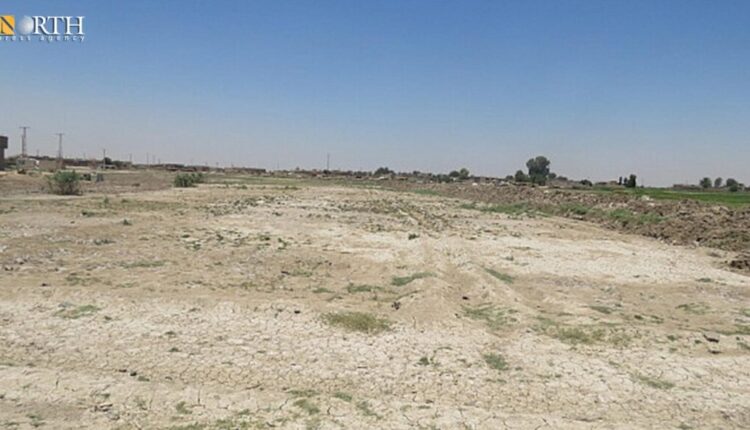
DEIR EZ-ZOR Syria (North Press) – Hassan tries to run his own pumping generator installed on the banks of the Euphrates River. However, oil spills in the river have precluded him to do so.
The farmer is scared that oil spills be pumped onto his land that would eventually prevent seeds to grow up and make the soil a barren one.
The 33-year-old Hassan al-Raghib, a farmer from the town of Sh’afa east of Deir ez-Zor, has abstained from irrigating his land, owing to a large mass amount of oil leaked onto the river.
People in Deir ez-Zor generally and farmers particularly are burdened by polluted water of the Euphrates River, owing to smuggling of oil materials, which has been recently on the rise, from areas under the control of Syrian Democratic Forces (SDF) to areas under the control of Syrian government forces.
Al-Raghib says he had lost more than two million Syrian pounds (SYP) in the last wintery season as a result of oil pollution thus soil on his land has been damaged.
“I was compelled to pay large sums of money to dig a well next to my land to wash the soil with underground water to repair the damaged soil, but to no avail,” he added.
Smuggling oil materials is carried out with very primitive ways; smugglers fill tanks with oil and put it into riparian ferries to be crossed into the government forces-held areas on the other side of the river where it is uploaded.
Mostly, smuggling operations leak oil onto the river as such tanks are old torn ones, water of the river many a time becomes black.
Owing to such leaks, soil is either damaged or becomes barren in east of Deir ez-Zor where locals depend largely on the water of the river for irrigation.
Addressing the issue
Farmers appeal to officials in the Boards of Agriculture and Environment to find rapid solutions to desalinate water of the river which makes the main artery for irrigation.
SDF periodically raids smuggling river crossings and routes that connect SDF areas with those of the government. Most raids result in clashes with smugglers.
According to locals, during clashes, SDF set fuels on fire or target ferries, causing oil leakage onto the river.
Diesel, benzene, gas and crude oil are the main items that are smuggled on such ferries, owing mainly to disparity in prices between the two sides of the river.
In SDF areas, a liter of diesel is sold in return for 1.200 SYP and a liter of benzene is sold for 2.000 SYP and kerosene in return for 1.700.
However, in areas under the Syrian government, a liter of diesel is sold in return for 1.950 SYP, benzene for 4.000 SYP and kerosene for 3.500 SYP.
An SDF leader, who spoke on condition of anonymity, said military forces strive to combat smuggling, especially since oil materials affect the economic balance in the region and cause damage to the Euphrates water, owing to leakages from torn tanks while in motion.
The leader affirms in the coming days patrols will be mounted on the river to combat such a phenomena.
Late in October, SDF raided smuggling river crossings in the towns of al- Shuhail, al-Zer, and al-Busayrah in the eastern countryside of Deir ez-Zor which led to sporadic light clashes with a bunch of smugglers.
At the time, an SDF source said the latter was able to seize large amounts of fuels meant to be smuggled to areas under the Syrian government while set ablaze other quantities on the western bank of the river which is held by the government forces.
Multi-folded catastrophe
Amid this status of the affair, Alaa al-Din al-Shakour, owner of a desalination station in the town of Derneg east of Deir ez-Zor finds difficulties in desalinating water, owing to spills of black oil around the deflation pumps.
“We have endured desalinating water from impurities, sediment and sanitary discharges which increased our plight immensely after the mass leakage of oil material onto the river,” al-Shakour added.
All in all, water desalination is an expensive issue that impinges upon locals. A barrel of desalinated water is sold in return for 6.000 SYP. Prior, it was sold for 2.000 SYP, according to al-Shakour.
From his part, Khalifa al-Zayed, an agricultural engineer and expert in Hajin east of Deir ez-Zor, warns of the continuation of oil droplets drift into the river, “oil is the most dangerous contaminant of soil, if continued to be irrigated with contaminated water, soil could become barren.”
The man adds oil materials contain phenol, cyanide, poisonous metal ions, hydrocarbons which could make soil a barren useless one.
Al-Zayed anticipates an agrarian and ecological catastrophes that could affect vegetation and humans if contamination proceeds in such a way.
